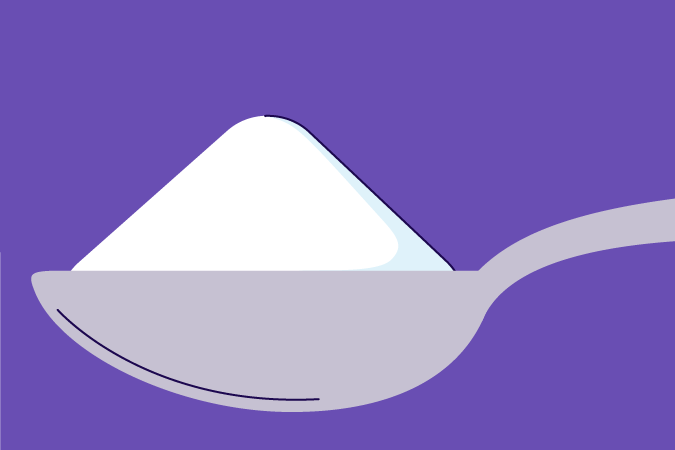Sugar and cancer
We look at the sources of sugar in our diet, and and examine the evidence and potential links between sugar and cancer.

On this page
Sugar is a type of carbohydrate that naturally occurs in fruit, vegetables and milk (including breastmilk). Sugar is also produced commercially from sugar cane and sugar beets – for example, table sugar.
You may see sugar listed on the ingredient list on a food label as sucrose, glucose, fructose, dextrose, maltose, corn syrup, honey, maple syrup, agave syrup, hydrolysed starch, invert sugar and corn syrup.
Is sugar harmful to your health?
The naturally occurring sugars in fruit, vegetables and dairy products are not harmful to your health, so there’s no need to limit these foods. In fact, they can be eaten regularly as they give you essential nutrients like fibre, vitamins and minerals.
On the other hand, you should try to reduce your intake of food and drinks that have added sugars, also known as “free sugars”. Examples include sugary breakfast cereals, chocolate, sweets, biscuits, cakes, pastries and sugary drinks like cola.
These foods and drinks don’t have the important nutrients your body needs, and they often contain a lot of calories, sugar, salt and fat. So, eating them too often or in large amounts can lead to weight gain and living with overweight or obesity can increase the risk of at least 13 types of cancer.
That’s why one of our Cancer Prevention Recommendations is to limit consumption of “fast foods” and other processed foods that are high in fat, starches or sugars.
How much sugar is recommended?
The type of sugars we eat too much of in the UK are “free sugars”. This is sugar that is added to food and drinks, and the sugar that is already in honey, syrups, fruit juice and fruit concentrate.
For people over 11 years old, it is recommended to have no more than 30 grams of “free sugars” a day – which is around 7 sugar cubes.
Tips to eat less free sugar
Compare food labels on packaged products
On food such as breakfast cereals, choose options with less sugar.
Swap sugary snacks
Swap out biscuits, sweets and sweetened yoghurts for healthier alternatives like fresh fruit, unsalted nuts, plain yoghurt, or for a savoury choice, wholegrain crackers with reduced-fat cheese.
Cut down on cakes and chocolate
Eat them less often or in smaller portions.
Instead of jam or chocolate spread …
… choose a small portion of nut butter, such as peanut butter, that has no added sugar, fat, or salt.
Cook more at home
Home cooking means it’s easier to control the amount of sugar in your recipes. You could use spices or fruit for flavour instead of adding sugar.
Sugar-sweetened drinks and cancer
We often don’t think about drinks having calories. However, sugar-sweetened drinks can be high in calories – they are quick to drink and don’t fill you up, so you may be drinking a lot of calories without noticing it.
There is strong evidence that regularly drinking sugar-sweetened drinks can lead to weight gain over time which can increase the risk of 13 types of cancer.
That’s why one of our Cancer Prevention Recommendation is to limit sugar-sweetened drinks. Drink mostly water and unsweetened drinks.
What are sugar-sweetened drinks?
- Regular soft drinks sweetened with sugar, like cola
- Flavoured water with sugar
- Energy and sports drinks
- Tea and coffee with added sugar or syrups
- Milkshakes with added sugar
How to cut down on sugary drinks
Choose water
Water is the best choice for keeping hydrated. Try to drink it more often than other drink. Add a slice of lemon, mint or sugar-free squash for flavour. Limit shop-bought flavoured water as it may have added sugar.
> Healthy hydration: why drinking the right thing is important
No add-ons
Avoid adding sugar, honey, syrups or whipped cream to your tea and coffee.
Get a low-sugar coffee hit
Opt for lower-sugar coffee options like a plain cappuccino or an iced Americano with a splash of milk instead of sweetened lattes, hot chocolates, sugary frozen drinks and milkshakes.
Go herbal
Try herbal or fruit teas – most are naturally sugar-free.
Go easy on fruit juices and smoothies
Limit yourself to one small glass (150ml) of unsweetened fruit juice or smoothie a day. These have some nutrients but can still be high in sugar and lack the fibre of whole fruit. You could also dilute fruit juice with water.
What about artificially sweetened drinks and cancer?
Sugar-free or diet drinks, which use artificial sweeteners instead of sugar, can be a helpful way to cut back on sugar. Some popular sweeteners include stevia, saccharine, acesulfame K and aspartame.
Despite some potentially harmful sounding headlines in the press about artificially sweetened drinks, there’s no strong evidence in humans to suggest that artificially sweetened drinks, such as diet soft drinks, are a cause of cancer.
However, fizzy drinks (whether artificially sweetened or not) are quite acidic, which is bad for our teeth. That’s why it’s best not to drink them regularly or in large quantities.
Living with cancer
After a cancer diagnosis, follow our Recommendations, if you can.
Diet and Cancer Report
Our 2018 Diet and Cancer Report looked at non-alcoholic drinks (including sugary or sweetened drinks) and cancer risk. It also looked at obesity, weight gain and cancer risk, and found strong evidence that:
consuming sugar sweetened drinks increases the risk of weight gain, overweight and obesity
consuming “fast foods” increases the risk of weight gain, overweight and obesity
